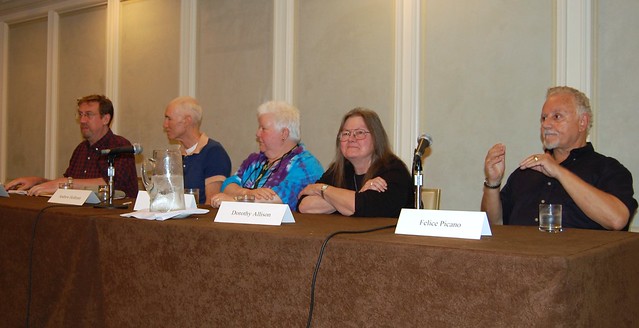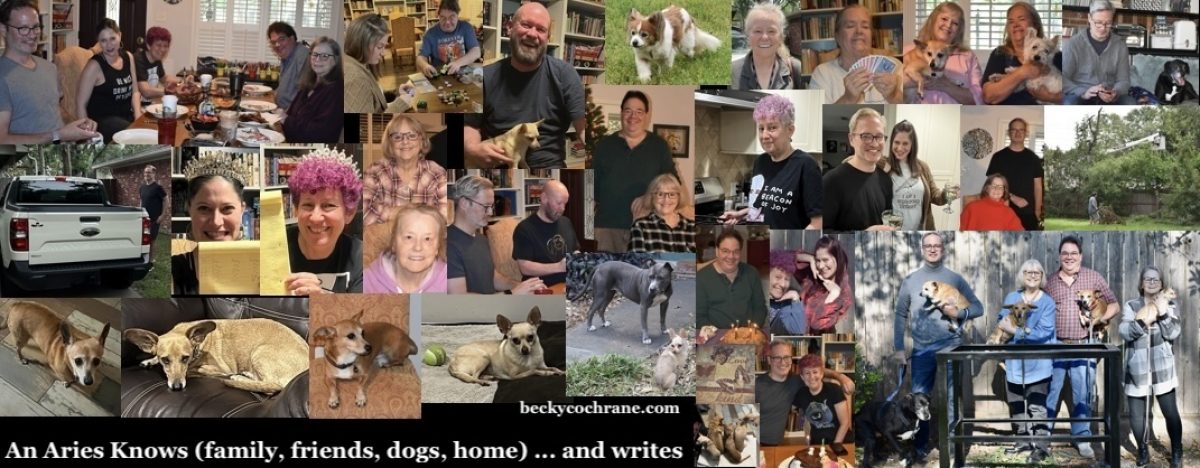The last panel I attended at Saints and Sinners was “State of the Art: LGBT Writing Past and Present.” The panel was moderated by Thomas Keith and the lively discussion was driven by Dorothy Allison (Bastard Out of Carolina; Cavedweller; She Who), Andrew Holleran (Dancer from the Dance; Nights in Aruba; The Beauty of Men; Grief), Val McDermid (author of 26 novels including The Vanishing Point; Wire in the Blood; Fever of the Bone), and Felice Picano (The Lure; Ambidextrous; Like People in History; Onyx; Late in the Season). This is one of those events about which I’m going to say–not meaning to be either coy or cruel–that you had to be there to fully appreciate the personalities of the panelists and the passion of the discussion.

What makes a piece of writing LGBT? Is it the sexual orientation of the author or the theme of the writing? For example, there are writers who identify as gay or lesbian who write mainstream fiction without gay characters or themes. There are gay and lesbian writers who write fiction with primarily gay characters and themes. There are straight-identified writers winning awards for novels about transgendered, bisexual, or intersex characters. There are writers who identify as straight writing mainstream fiction with secondary gay and lesbian characters. There is fiction which takes place primarily in gay urban enclaves with almost all gay and lesbian characters, and no one is exactly sure who writes it because the authors’ names are initials or gender neutral (“It’s Pat!”).
You might be asking what difference it makes, which means you’ve probably never been witness to the (figurative, I hope) blood baths that happen when these questions are discussed among writing groups as applied to getting published, finding readers, and winning literary awards. I’ve seen my own writer name bandied about in those battles a time or two, and I don’t have much desire to refight them, but it’s never good to make assumptions about my point of view. If you didn’t hear something from me, you don’t know what I think. And at that, what I think may evolve.
When publishing is talked about in general terms–as in, all publishing, not related to particular niche markets or genres, or even format (newspapers, for example, as well as novels and short story collections)–I often think of the history of commerce during my lifetime. When I was growing up among the small towns of the Southeast, we generally had a “downtown” or a town square, where most of the merchants were located. To shop, we walked in the open air from one store to the next. Most businesses were locally owned, and even if they weren’t (Western Auto or Sears, for example), they were franchised or managed by people we knew. The sun or rain beat down on you, and you stopped into the drugstore or the local sandwich stop for lunch or even just a cold Coke, then you finished your shopping (or “just looking”) and piled into the car and went home. If you lived in a larger city, there were shopping centers: an L shape of mostly locally-owned stores around a parking lot, often anchored by a grocery store for one-location shopping.
Then came the great reign of the malls, when all the stores were inside and the climate was controlled and music was piped in. You might still know a few managers or merchants, and mostly you just wandered, a little dazed, with the sound of water splashing in a center-court fountain where you dropped pennies and wished for more money to buy more stuff. You might even forget what city or town you were in, because malls, even with different anchor stores, were generic: department store(s), gift stores, novelty stores, home decor, maybe a store that sold pianos where an employee sat, day after day, playing alone, because almost no one went inside, gender-specific fashion stores, a jewelry store or two, and around it all a parade of seniors walking in their pastel track suits during the day and groups of bored teens on weekends and summer days–mostly in the food courts and arcades.
Then the super discount chains began to steal customers from the malls: Walmart (and for a while, KMart), Sam’s Club, and Costco, where you could also sometimes buy gas for the cars you had to drive to get to these monoliths. Then people began to complain about where the merchandise comes from and how the buildings themselves are a blight on the landscape, and suddenly, popping up in the suburbs, came artificial town squares and outlet malls, places with landscaping and brick “streets” where shoppers walked from store to store in the open air and dashed into a sandwich shop…
Everything old is new again.
There used to be a few big publishers and they wouldn’t touch LGBT-themed books because they were controversial or they thought they couldn’t sell them. Small presses formed to give LGBT writers a chance to tell their stories and market them. And they did sell, and as these marginalized groups fought for and won more visibility, along with the writers who wrote about them, the big publishers caught on and some of those writers were published to acclaim and awards. Then the small independent bookstores that once sold titles for and to that limited market (and other limited markets) were gobbled up or run out of business by the chains and big box stores that could stock more titles. Except publishing also changed, because, according to some observers of the marketplace, other entertainment was available 24/7 so people weren’t reading as much. The big publishers with high overhead struggled and the brick-and-mortar stores, blaming e-books for their diminishing business, began to sell non-book merchandise and when that didn’t work, to close, and nobody wanted to publish anything unless they thought it was a sure seller (written by someone with a proven track record or a celebrity or at least someone with a TV show of some sort)–and where did all this leave LGBT writers or LGBT-themed books?
Into the breach arrived the small presses. And the university presses. We’ve been here before: see above.
Some of the best books I’m reading may have a limited print run or be available only as e-books, but as I said in an earlier post, if you write something good and you are persistent, you can find a publisher. People still love to read, and in time, more people will discover or develop that love and they will buy books, and good books will sell more than bad books, and because of that, the work of editors will be valued again, and well-edited books will sell more than poorly-edited books. The manufacturers and sellers of e-readers are fearing that their market has reached its peak, that readers are already tiring of the novelty, and from consumers, I’m starting to hear more, “I just want to go to a little bookstore where they know me and what I like to read and can recommend and sell me a book. A real book I can hold in my hands and loan to a friend and that no vendor can ‘erase’ from my e-reader because the vendor is mad at the publisher…”
What do I think this all means? That no one really understands this industry in flux, and it will evolve to sustain itself. If the “experts” don’t know, how can you? Write what you want to write. Let your creation begin with love. Treat it with kindness and discipline. Don’t write to markets or trends. Publish what you write the best way you can find. And then–here is the final piece of advice from me that I wish every writer would heed–LET IT GO. I don’t mean don’t promote it (although sweet baby Veg-O-Matic, not every day, over and over, on every bit of social media available to you, because you are alienating the shit out of everyone, including potential readers). Yes, blog it. Sign it. Send out postcards. Whatever. But LET IT GO in terms of, don’t compare your sales to every other writer’s sales. Don’t obsessively read your reviews and engage in discussions–dare I say, fights?–with people who don’t get it or don’t like what you’ve written. You can’t control how your work is received, and not everyone will understand and love everything. Don’t resent other writers whose work (you think) is selling more than yours. Don’t feel like another person’s success robs you. There is room for all the books and all the authors: Books are like drugs. The more people read, the more they want to read, and I can’t tell you how many times, as a bookseller or when attending events related to books, I’ve heard people say, “I read this one book with a (gay or female or teen or detective) character and then I went to my library (or bookstore) to find more books like that.” Every success builds the market and gives you a greater chance of being published and read.
The book that sells a million copies may end up with a disgraced author and can’t even be located in a remainder bin a year later. The little book that never took its author out of obscurity suddenly finds an audience twenty years after his or her death. Hateful comments from a reviewer–or a lot of them–sometimes make a person like me pick up a novel out of sheer orneriness (“If it pisses off the mob, must be something to it!”). As a writer, you really can’t control all of that. You can control what happens when you sit down with your iPad or smart phone or computer or legal pad or Moleskine to write that story.
And then what happened?

your contra-contrariness speaks well of your open-mindedness, and a willingness to accept the unacceptable as a form of acceptability. as niels bohr has so eloquently demonstrated with his notion of complementarity, when one accepts opposites the opposite itself is accepted.
Your comments always send me running directly to the Internet to research stuff. “Stuff” being my word for all those things that blow my mind.
I think being compared to Niels Bohr definitely qualifies as mind blowing.
you are an angel!! I have been looking for a poem all day, I had no idea who wrote it, the title and I could not find it, until I came here to your lovely blog and saw “remainder bin”
http://web.cs.dal.ca/~johnston/poetry/bookofmyenemy.html
You know what made me laugh? The hope that I could have an enemy who’d say, “She babbled 1646 words about the state of writing, and Marika read it and shouted, ‘Remainder bin!'”
Clive James would appreciate that. Also, if you’d like to read him taking (cleverly self-deprecating yet humble bragging) shots at Dan Brown, here’s a new article: http://www.usatoday.com/story/life/books/2013/05/14/clive-james-dan-brown/2155487/
he worked in a slam on Jeffrey Archer too … well played.
Wise words. I have learnt through experience about comparing oneself to others. Listening to constructive criticism can be a very valid learning experience, but not necessarily to be taken as gospel.
Thanks. I’ve generally found that my reaction both to positive and negative feedback teaches me something even beyond the feedback.